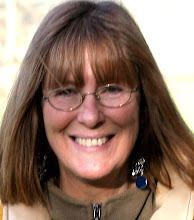Friday, 25 July 2008
Detouring
Thursday, 24 July 2008
Sex Bomb!
Thursday, 17 July 2008
OI, where are MY royalties??
A few entries ago I mooted the potential of high decibel James Blunt as a Weapon of Mass Destruction (Click here: Ban this ban that, what's the world coming to????). It would appear that the CIA really do spy on blogs because they have stolen my idea, tweaked it a bit to avoid my tort for theft of intellectual property rights, and put it into practice. Prisoners in Guantanamo Bay are being bombarded non-stop with David Gray's 'Babylon' at top volume.
I have just two observations on this 1) if the poor beggars are still holding out after this cruel torment then they must be innocent and 2) I appear to have missed my natural calling. Tho some of my kids wouldn't agree there.
Wednesday, 16 July 2008
Summer is a comin.......going, going, gone.




Would a rose by any other name smell as sweet?
Expectant parents spend literally months reading endless published Baby Name lists and having fraught conversations about the forename they will give their infant. It's one of the ever-present banes of (other people's) pregnancy in my opinion but then I've never been very imaginative.
I've been reading a research paper written by economists S. Levitt and R. G. Fryer Jr. and expanded to a chapter in the very entertaining and fascinating 'Freakonomics' by Levitt and Dubner. The paper looks at the gulf between black and white culture in the USA. One very noticeable difference in cultural indicators is that black parents give their children names that are starkly different to those given to white children. (and of course vice versa). The paper: The Causes and Consequences of Distinctively Black Names is summarised below:
This research was based on an extremely large and detailed data source of data: birth registration information for every child born in California since 1961 - more than 16 million births. It included standard items like name, gender, race, birthweight, and the parents' marital status, as well as more telling factors: the parents' ZIP code (which indicates socioeconomic status and neighbourhood racial composition), their means of paying the hospital bill for the birth (again, an economic indicator), and their level of education.
The California data establish just how differently black and white parents have named their children over the past 25 years or so - a side-effect maybe of the Black Power movement. The typical baby girl born in a black neighbourhood in 1970 was given a name that was twice as common among blacks than whites. By 1980, she received a name that was 20 times more common among blacks than whites. (Boys' names moved in the same direction but less so - parents of all races apparently less adventurous with boys' names than girls'.)
Today, more than 40% of the black girls born in California in a given year receive a name that not one of the roughly 100,000 baby white girls received that year. Even more remarkably, nearly 30% of the black girls are given a name that is unique among every baby, white and black, born that year in California!
The data offer a clear picture of which parents are most likely to give a child such a distinctively black name: unmarried, low-income, undereducated, teenage mothers from black neighbourhoods who themselves have distinctively black names. Giving a child a super-black name would seem to be a black parent's signal of solidarity with her community. White parents, meanwhile, often send as strong a signal in the opposite direction - more than 40% of the white babies are given names that are at least four times more common among whites than blacks.
The California names data offer the opportunity, by subjecting this data to regression analysis, to tease out the effect of any one factor (in this case, a person's first name) on her future education, income, and health.
The data show that, on average, a person with a distinctively black name - whether it is a woman named Precious or a man named DeShawn - does have a worse life outcome than a woman named Emma or a man named Jake. But it isn't the fault of his or her name. If two black girls, Uniqque Williams and Claire Williams, are born in the same neighbourhood and into the same family and economic circumstances, they would likely have similar life outcomes. But the kind of mother who names her daughter Claire doesn't tend to live in the same neighbourhoods or share economic circumstances with the kind of mother who names her daughter Uniqque. And that's why, on average, a girl named Claire will tend to earn more money and get more education than a girl named Uniqque. Parental income and educational level is the prime factor in the child's own eventual socioeconomic position. Uniqque's name is an indicator - but not a cause - of her life path.
In my work I tend to see a lot of forenames of school age children. Generally, altho I've not compiled my very own data set so this is no more than an anecdotal observation: the children attending 'good' or 'excellent' schools as judged by Ofsted tend to have very different forenames to those attending 'satisfactory' or 'inadequate' schools. Jack and Harry, Olivia and Jessica even on those uncommon occasions where they attend the same school are not found in the same academic sets as Jayden and Chokota , Alexus and Madonna - but are most often not found in the same school. As Levitt and Fryer conclude, it's not the names themselves which account for the difference in life outcomes, but that the names they are given indicate their parents' life position - and parents socio-economic position is the foremost and principal determinant of the child's.
Having said that when we hear that someone is named Chokota I believe that we form prejudgements about them, about their abilities, habits and expectations - and those prejudgements themselves are an important limiting factor. (Unless of course it happens to be Chokota Beckham in which case we'll assume that they've had the best education money can provide.) The reverse, imo, is true when we hear a child is named Tristram or Miranda - our expectations of them are set by a prejudgement based on their forename only.
So, imo, whatever our social class it's important that we give our children forenames that at the very least will not prejudice their life chances. Those interminable hours spent coming up with suggestions and arguing about whether baby is to be a John or a Jodrell actually are absolutely crucial.
Saturday, 12 July 2008
Population and some thoughts on abortion.
20 years ago ultrasound scanning came into widespread use in China and Asia generally and gave pregnant women a cheap and readily available means to discover the sex of their unborn foetus. The results, by the million, are now coming to maturity in Bangladesh, India, Taiwan and China. By choosing to abort females and give birth to males millions of Asian parents have propelled the region into a unique experiment in the social effects of gender imbalance.
As a result of foetal gender selection the natural (universal non-selective) balance of about 105 male births to 100 female has grown to around 120 male births for every 100 female births in China. The imbalance is even higher in some locales; 136 males to 100 females on the island of Hainan, an increasingly prosperous tourist resort, and 135 males to 100 females in central China’s Hubei Province. According to the China Family Planning Association Lianyungan, a booming port, has the most extreme gender ratio for children under four - 163 boys for every 100 girls. There are currently 37 million more young men than young women in China.
Similar patterns can be found in Taiwan, with 119 boys to 100 girls; Singapore, 118 boys to 100 girls; South Korea, 112 boys to 100 girls; and parts of India, 120 boys to 100 girls.
(China, India, and other nations have now outlawed the use of prenatal diagnostic techniques to select the sex of an unborn child but a suitably compensated ultrasound technician need only smile or frown at the expectant mother or father.)
Many of these excess boys will be and are poor and rootless, a lumpenproletariat without the consolations of marriage and family. Prostitution, sex tourism, and homosexuality may ease their unfulfilled urges, but Asian societies are witnessing far more dramatic solutions. Chinese police statistics recorded 65,236 arrests for female trafficking in 1990–91 alone. Updated numbers are hard to come by, but it’s apparent that the problem remains severe. Mass sexual frustration is thus adding a potent ingredient to an increasingly volatile Chinese mix of problems that include surging economic growth, urbanization, drug abuse, and environmental pollution.
Beijing expects that it may have as many as 40+ million frustrated bachelors by 2020. The regime, always nervous about social control, fears that they might generate social and political instability. What are the chances hmm? Well, China watchers are already seeing signs of growing criminality; over the past decade, as the (post ultrasound) boys have hit adolescence, the country's youth crime rate has more than doubled.
One might assume that China’s economic growth will solve the problem, as prosperity removes the traditional economic need for poor rural peasants to have sons who can work the land but the numbers don’t support that theory. Indeed, the steepest imbalance between male and female infants is found in the most prosperous regions, such as Hainan Island and Lianyungan.
The long-term implications of the gender imbalance are largely guesswork because there is no real precedent for imbalances on such a scale. A Beijing powerstruggle between cautious old technocrats and aggressive young nationalists may be decided by mobs of rootless young men, demanding uniforms, rifles, and a chance to liberate Taiwan. A study undertaken under the aegis of the CIA suggested “in 2020 it may seem to China that it would be worth it to have a very bloody battle in which a lot of their young men could die in some glorious cause.”
In contrast a study in the USA into criminality and specifically the sudden drop in crime rates in the 1990s suggested that the legalisation of abortion in 1973 was a key factor. By 1980 1.6 million abortions were carried out annually - almost 1 abortion to each 2 live births.
Thursday, 3 July 2008
Having a breakdown :O(
Wednesday, 2 July 2008
Isn't this a good idea!
Oh the horror, the horror!
Imagine the bladder weakening thrill as, on my own in the house when tidying up before going to bed, I found an elephant hawk moth sitting in my kitchen sink. A horrifying 2½" across and flesh coloured with a body the size of Felix's thumb it leered up at me and challenged me to hold my ground without whimpering. I lost and snuck off to bed leaving it lurking there.
Of course I couldn't get it out of my mind and eventually went back downstairs and, without putting the overhead lights on, I managed to drop a teatowel over it and gently roll it inside. I unlocked the courtyard door and in my nightie in the rain opened out the teatowel on the table. The moth scowled up at me and refused to move so I shook the teatowel. It lurched with (I swear) an audible thud onto the table top and then horridly fluttered down to the bench seat where, like a ginger flash, my cat Dennis leapt on it and finished it off with one crunch.

